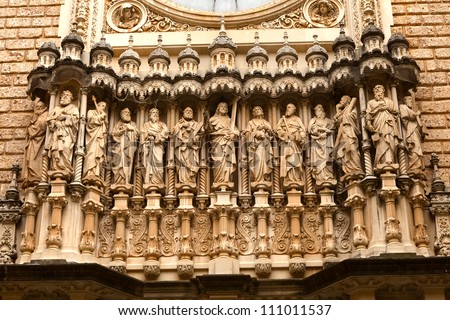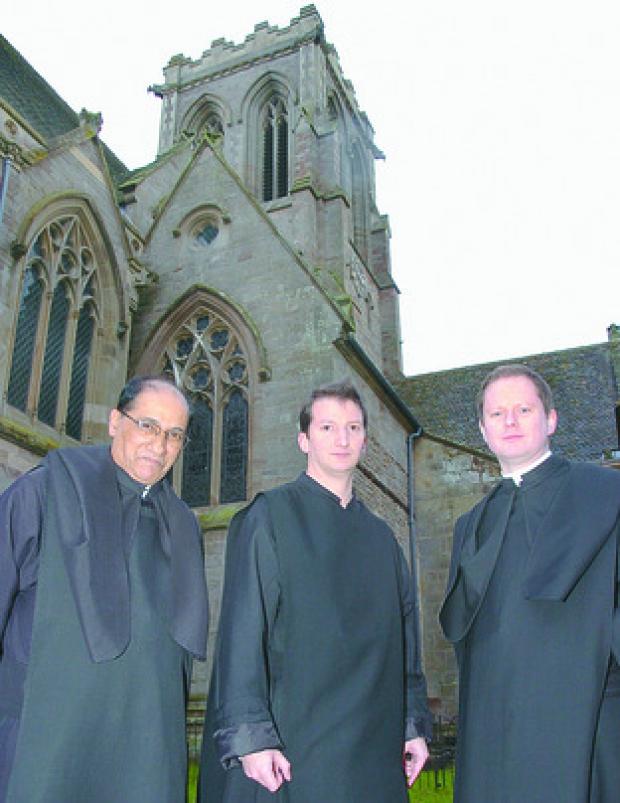my source: Abadia de Montserrat
The main aim of the Montserrat Benedictine community is to insure that the mountain, the Monastery and the Sanctuary remain place of where people gather and workship. The present community at Montserrat is made up of over seventy monks. As in all Benedictine monasteries, the Montserrat monks dedicate all their life to prayer, providings shelter and work. Life in the monastery follows a set rhythm in which work and prayer both play a part, according to Saint Benedict's motto, Ora et labora. The clock is a useful tool for the monk, as making the most of time is essential in Montserrat.
The monastic life
In the spirit contained in the Rule of St. Benedict, monks seeking to live in praise and intercession, in adoration and silence, to better serve the men and women everywhere from the depth that gives the experience of the things of God and knowledge of the deepest yearnings of the human person
Benedictine Community life is eminently suited to a life seeking God, and becoming a monk, a brother among brothers who help him in his progress towards God, is a tried means that is described in the New Testament.
Prayer
The monks have always tried to combine solitude with hospitality, two concepts which would appear to be mutually exclusive but which in fact are not. The tension between the two has been fruitful over the years for the monks themselves, the Church and for society. The secular history of the community of Montserrat is eloquent proof of this. Solitude enables the individual to find the light of the Word of God; thus the person gradually moves towards self-acceptance, peace and inner harmony. This occurs above all during the passionate search for God through the liturgy and private prayer.
The liturgy marks the daily rhythm for the monastic day, marking both its beginning and end. The monks come together five times a day to celebrate divine service on the Liturgy of the Hours. In addition to this, there is the celebration of the Eucharist, which is the central event in the day of the Monastery and Shrine. Many pilgrims take part in the monks' liturgy, particularly in the Eucharist and the main hours of divine service.
The monks also set part of the day aside for private prayer and for reading the Word of God or other spiritual works. The ideal situation, as given both by the New Testament and by the Benedictine Rule, is for prayer to God to be as continuous as possible.
Work
This openness to solidarity and communion with all manifests itself a Montserrat through various pastoral activities: services at the Basilica, welcoming of groups, retreats and conferences, the provision of lodgings. In addition to this pastoral work, the monastic chores include the humble tasks required to ensure the good running of the Monastery and the Shrine and some craft work. There are also monks involved in scientific research in various fields including history, theology, translation, biblical studies, liturgy and philosophy. The Monastery has a notable publications service, which publishes numerous books and magazines on science or for circulation on speciafically religious as well as cultural themes. The service also puts together records and audiovisual material. Indeed, Montserrat occupies an important position as one of the principal centres of Catalan culture.
Hospitality
The life of the monks in terms of humanity and faith is no different to the basic experience of all men and women because, when all is told, we all live with the same problems around us: problems regarding love, solitude, personal harmony, solidarity, work, use of material goods... and, sometimes, wearied or even weak faith.
The life of faith leads the monk to discover the presence of Christ in another, whoever he or she may be. This means the monk must welcome him or her in a sincere and friendly manner and must feel himself to be the brother of all people.
A comunity of spirit
Montserrat, -mountain, sanctuary, monastery- is, through all these specific, material determinations, a community of spirit open to all horizons in its rallying-centre of fraternity and hope.
THE CHOIR SCHOOL OF MONTSERRAT
Boys’ Choir
Montserrat is home to one of the oldest boys’ choirs in Europe. Documents testify to the existence of a religious and music school in Montserrat as far back as the 14th century.
The Escolania now accompanies religious ceremonies and communal prayers in the basilica. All the choir members receive a high standard of musical training, along with human and intellectual education. The choir enjoys international fame and prestige, giving concert performances all over the world, as well as building up a large catalogue of recordings.
Over the course of its history, the school has produced a good number of choirmasters and musicians, as well as well-known composers and teachers. The Escolania also enables some of the monks at Montserrat to work in the field of composing, producing and teaching music.
THE CONSECRATION OF THE ALTAR BY POPE BENEDICT XVI IN THE CHURCH OF THE SACRADA FAMILIA IN BARCELONA, (abbey choirboy singing)
SERMON BY ABBOT PAUL AT BELMONT ON THE CLOTHING OF BROS. DUNSTAN AND ALISTAIR & THE EVENING BEFORE THE PROFESSION OF BR DAVID
Conference 1st February 2013
Clothing of Paul Nelson and Alistair Findley as Novices
Br David is the middle one with Br Patrick on our left and Br Hew on our right
Dear Br David, it’s a year today since you received the habit and tomorrow you will make your profession and receive the real monastic habit, which is the cowl. I’m not quite sure how things seem to you, but to me the time of your novitiate has flown by, so it’s a blessing that you will remain in the novitiate for another year under the guidance of Fr Brendan. Make the most of it: the novitiate is a real blessing and a unique opportunity for the peace that is supposed to be the monastic life!
Tonight my words are directed to you, Paul and Alistair, as you ask to be admitted to the monastic way of life in this community. Now that request and the specific way it’s worded, have a lot to teach us. I say us and not just you, because every clothing is a reminder to us all, the entire community, of what it was we requested when we became novices and what it is we ask of God every day of our lives. “We ask to be admitted to the monastic way of life in your community.” Forgive me if I dwell on that sentence word by word.
To begin with, you are asking the Belmont Community to be admitted to the monastic way of life in its ranks. You are asking to become monks of Belmont, not monks of another monastery or even members of the English Benedictine Congregation or the Order of St Benedict. It is Belmont and this Community alone that you wish to join. Now, obviously, that’s no mere wish or whim, but a response to God’s call, the Lord’s invitation to seek and find him as monks of Belmont. If you are not being called by the Lord, then you will not persevere. If you are not prepared to do his will, you will eventually leave. I know that sounds harsh, but it’s true. None of the consolations of life at Belmont will suffice, if you are not focussed on the search for God and on a life of prayer and work. But, as St Benedict makes clear in the Holy Rule, that search can only bear fruit in the context of community life and love of the brethren. We are not gyrovagues or sarabaites, not even hermits, but coenobites and that means we share all things and hold all things in common, both material and spiritual. We walk a common path. We don’t go our own way.
Secondly, the request for admission is just that, a request, and the answer of the Belmont Community is not automatic. In the novitiate you will be tried and tested. To tell the truth, that’s how it will be for the rest of your lives. However, if we put ourselves firmly in God’s hands, he will take care of us and give us all the graces we need to persevere and never give up. In fact, I believe it’s essential to make that decision, that act of the will, through God’s mercy never to leave, from the very moment we set foot in the monastery as postulants, even more so now as you begin your novitiate. I can remember, as a novice, being tempted many times to give up and run away, the world was so inviting, but together with my fellow novice, Fr Michael, we decided we would never leave, no matter what happened. Entering a monastery really is an act of faith: we place our trust in God because he has placed his trust in us. God puts his faith in us because he hopes that we will respond fully to his gift of a monastic vocation, and what a tremendous and beautiful gift that is. I can think of nothing more wonderful. Not only the Novice Master, but all the brethren will help you, each in our own inimitable way, to grow in your monastic vocation and in your Catholic faith and so become good and faithful monks of Belmont.
Thirdly, you are asking to embark on an adventure, the monastic way of life, the Benedictine way. To become a monk really means living a particular, a peculiar way of life, in which every aspect, every detail, is marked by the Gospel of Jesus and the Rule of St Benedict. It is no coincidence that the Holy Rule is a collection of scriptural quotations and references together with a very practical interpretation of them for life in a monastery. Benedictine life is, above all and before all, Christian life lived to the full, to the ultimate consequences. It is a life of discipleship, in which we follow Jesus on the way of the Cross and have our gaze fixed on him and on him alone. It is a way of life that can also be summed up in the three traditional monastic vows: obedience, conversatio morum and stability. During the novitiate you will be trained to live according to those vows. They are meant not as obstacles but as a means to the faithful following of Jesus, our true King.
And finally, as you are clothed in the habit tonight and start your novitiate, it is monks of Belmont that you long and aim to be. You must become fully integrated into the community. Benedictines do not have large novitiates and special novitiate houses, communities and places that are transitory. For better, for worse, for richer, for poorer, you will be married to this community and form part of this conventus or monastic family. Look nowhere else. Stop comparing. Stop thinking, even. Just settle down and consider this your home and we your family. Not that we give up our families, far from it. Together with you, they will become part of the wider Belmont community and the object of our daily prayer.
So Paul and Alistair, our prayer for you tonight and throughout your novitiate is that you will fulfil your good purpose, find joy in truly seeking God and remain zealous for the work of God, for obedience and for fraternal charity. May the good Lord bless you, and, taking the Gospel as your guide, may you hasten to the perfection of the monastic life and that love of God, which casts out all fear. Amen.

)/App_Themes/White/Images/ctatmonastica.jpg)



)/App_Themes/White/Images/ctatmonjos.jpg)










No comments:
Post a Comment